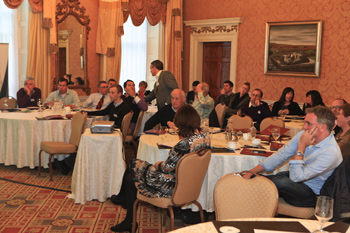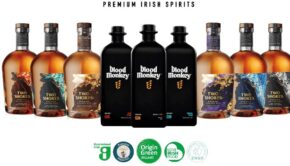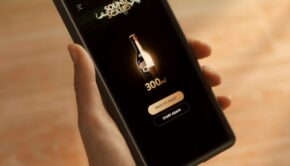Consumers don’t trust wine quality in pubs & bars

The first-ever breakdown of Ireland’s 1.7 million on-trade wine-drinkers was presented to guests at the second in Searson’s ‘Expert’ series held in the Shelbourne Hotel recently when Lulie Halstead, Chief Executive of Wine Intelligence provided those attending the seminar with a clearer picture of Ireland’s 1.9 million wine drinkers.
17 October 2012
Wine Intelligence sought to get a market profile of this sector and to answer a number of trade questions such as ‘Do you really understand your customer and his/her wine preferences?’, ‘What is the key profit area for businesses in wines and is wine being properly offered?’, ‘What are the triggers which provoke positive responses from wine drinkers?’ and ‘How can wine be presented to increase sales and generate repeat customer visits?’.
The company’s vinitrac research among 556 wine drinkers here last March revealed that 30 per cent of them were 55 years-old and over, 22 per cent were 25 to 34, 21 per cent were 34 to 44, 17 per cent were 45 to 54 and 10 per cent were in the Legal Drinking Age to 24 age brackets.
“The average age of a regular wine drinker is 49 in Ireland, the same as in Australia, Canada, the UK and the USA – most of the established import-based wine markets,” she stated adding that, “What the age breakdown highlights is that – by-and-large – those serving the wine consumer in the on-trade tend to be much younger than them.” The survey also found that the Irish, at 47 per cent, drink wine in bars and pubs less than their English counterparts at 67 per cent.
According to Lulie Halstead, the low figure here is to do with consumer confidence.
“Relatively” she explained, “Ireland has less confident consumers who stick to what they know. They’re less experimental. It’s also about trust in the wine quality in pubs and bars. The safer option for them is to have beer or spirits when in a bar. They’re not comfortable in the wine offering in bars and pubs so there’s a great opportunity here.”
However the proportion of those drinking wine in restaurants in England and Ireland was the same at 88 per cent.
Consumers had expressed disappointment in by-the-glass wine, she stated, perhaps as it was not being kept at a good enough quality but was not sure exactly why consumers don’t really like it. They perceive house wine by the glass to have historically been of lower quality, she stated.
Price, varietal and brand dominate over country-of-origin when it comes to choosing wine with the Promotional Offer, the Grape Variety and ‘a brand I’m aware of’ all scoring 72 per cent preference with Irish consumers. ‘Recommended by peers (friend or family)’ scored slightly lower at 69 per cent with Country of Origin scoring 65 per cent.
This compares to the UK scores of 67 per cent for Promotional Offer, 66 per cent for Grape Variety, 64 per cent for ‘a brand I’m aware of’ and ‘Recommended by peers’ with Country of Origin scoring 59 per cent.
Overall, the Irish are a bit less adventurous, she commented.
‘I know what I like and I tend to stick to what I know’ said 38 per cent while 20 per cent stated, ‘I don’t mind what I buy so long as the price is right’. Only 42 per cent stated, ‘I enjoy trying new and different styles of wine on a regular basis’.
Experimentation is to be encouraged, said Lulie Halstead, “as experimentation leads to trading up and higher margins in the trade so that 38 per cent category needs help. How can we do this?” she asked.
For the on-trade research carried out, she’d established ‘three steps to heaven’ from the consumer perspective. These consisted of having the right atmosphere for purchasing wine, an appealing wine list and knowledgeable service.
See the full report in our November issue.



 Print
Print






Fans 0
Followers